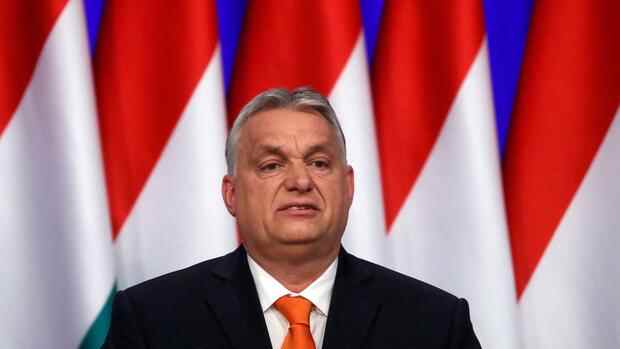Hungary’s prime minister is fighting for re-election – with questionable means.
(Photo: Reuters)
Vienna Whether or not Hungary will receive money from the EU’s recovery plan after the Luxembourg judgement, the country actually does not need any injections of liquidity at the moment. “The country’s economy is overheating,” says Sandor Richter from the Vienna Institute for International Economic Comparisons (WIIW). This is evidenced by the relatively high inflation in the country. In January, it was 7.9 percent calculated over twelve months.
The European Court of Justice (ECJ) had previously dismissed a lawsuit by Poland and Hungary in its entirety. The aim of this lawsuit was to overturn the regulation that has been in force since January 1, 2021, on the basis of which rule of law proceedings can be initiated against member states and their financial resources cut. The effects of the judgment are still open.
However, Hungary is in a special situation: Economists are already discussing to what extent the high energy prices are responsible for inflation and to what extent the inflation is due to developments in the domestic economy. And Prime Minister Viktor Orban is fueling inflation with gifts to the population. Parliamentary elections will be held in Hungary at the beginning of April.
Orban and the united opposition are more or less even in the polls. In order to get the upper hand at the last moment, Orban resorted to the bag of tricks of authoritarian rulers: First, he promised various sections of the population more money. Second, he froze certain prices.
Top jobs of the day
Find the best jobs now and
be notified by email.
Young and old have recently received financial benefits: people under the age of 25, for example, will not pay income tax from this year, homeowners with at least one child will receive money for home renovations and retirees will receive a 13th month’s pension. There were strong wage increases for police officers (plus ten percent) and health workers (plus 21 percent).
On the other hand, Orban froze prices, such as those for granulated sugar, wheat flour, sunflower oil, pork legs, chicken breasts and milk. There are also upper limits for mortgages and petrol.
Petrol station owners have since registered a protest. Although they have to buy the fuel at constantly increasing prices, they cannot pass these on to the car owners. They are also under pressure because of the “tank tourists” from neighboring Slovakia, for whom it is now cheaper to buy fuel in Hungary than at home.
The desire to consume is there, but the goods are missing
The example of Hungary thus expresses a certain problem with the EU financial package. It is true that certain sectors are suffering from low demand, such as international city tourism. A general lack of consumerism is not the problem of the economy. Consumers are quite willing to spend their money. But there is a lack of supply in many areas, not only in Hungary but everywhere in Europe.
Now, in the Central European state, demand is being additionally inflated by Orban’s policies. Monetary policy shows how paradoxical the situation is: in order to combat inflation, the country’s central bank recently raised interest rates several times. This also raises mortgage loan rates, which Orban is trying to dampen with a cap.
This is definitely not sustainable economic development. “Whoever will form the new government, those responsible will have to step on the brakes,” says expert Richter from the Vienna Institute for International Economic Comparisons.
If the opposition comes to power, it will start with a legacy. First of all, inflation will be high compared to other European countries. Stately energy prices combined with rising wages could keep inflation high, writes Erste Group economist Orsolya Nyeste. Second, the government’s budget deficit is likely to be above average for the time being.
And any new government will have to contend with a hostile environment. Much of the media is dominated by Orban’s supporters. They will stir up anti-government sentiment. Especially if they have to withdraw certain economic policy measures in order to bring Hungary back into balance economically.
More: Viktor Orban – in the service of the Kremlin master.
